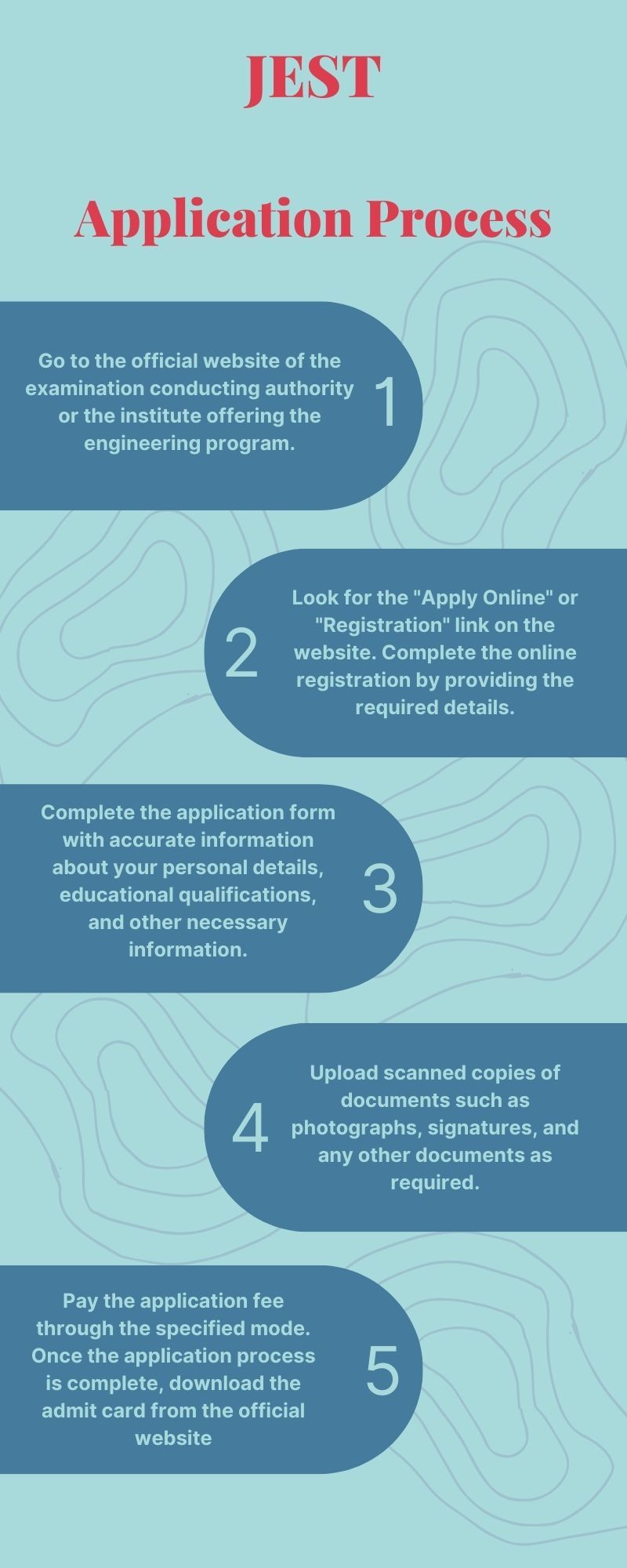Joint Engineering Screening Test
JEST Highlights
| Exam Specifics | Details |
|---|---|
| Exam Name | Joint Engineering Screening Test |
| Conducting Body | Indian Institute of Space Science and Technology (IIST) |
| Exam Level | PhD level |
| Mode of Exam | Offline |
| Exam Duration | 180 minutes |
| Exam Frequency | More than once a year |
| Exam Helpline | 0471 256 8477 |
| Exam website | https://www.iist.ac.in/ |
JEST Overview
The Joint Engineering Screening Test ( JEST ) is a comprehensive examination that assesses the aptitude and knowledge of candidates seeking admission to engineering colleges in India.
Conducted annually, JEST serves as a common platform for aspirants to showcase their abilities in subjects such as mathematics, physics, and chemistry.
The test evaluates the fundamental understanding, problem-solving skills, and logical reasoning of applicants.
JEST aims to provide a fair and objective assessment, enabling colleges to identify eligible candidates who possess the necessary skills and potential to excel in the field of engineering.
This highly competitive exam presents an opportunity for students to secure admissions in renowned institutions and offers a broad range of engineering disciplines to choose from.
It serves as a stepping stone towards a successful engineering career by ensuring that candidates are well-prepared and equipped with the essential knowledge required to meet the industry's demands.
By covering a wide array of topics within the science and mathematics domains, JEST aims to assess the holistic understanding of candidates.
With its rigorous evaluation process, JEST not only helps colleges in selecting the best candidates but also offers students an unbiased platform to showcase their abilities, thereby promoting merit-based admissions.
Aspiring engineers who are eager to embark on their academic journey and contribute to the rapidly evolving engineering field can rely on the Joint Engineering Screening Test to navigate through the competitive admissions process and secure their place in a reputable engineering college.
JEST Eligibility
Eligibility criteria play a pivotal role in JEST examination, as they provide a framework to determine the candidates' suitability and ensure a level playing field for all applicants.
- For the Joint Engineering Screening Test, several key prerequisites need to be met by prospective candidates.
- Firstly, aspiring candidates must have completed their high school education or any equivalent examination.
- This ensures that individuals possess a foundational knowledge base that serves as a solid stepping stone for higher education in engineering.
- Additionally, candidates must have studied and passed specific subjects such as Physics, Chemistry, and Mathematics during their high school years.
- Proficiency in these subjects is crucial for success in engineering studies and reflects the technical aptitude required for the field.
- Furthermore, the minimum age requirement for appearing in the Joint Engineering Screening Test is 17 years old, ensuring that candidates have crossed a certain maturity threshold and are ready to take on the challenges of a rigorous examination.
- Candidates must also hold valid identification documents, such as a government-issued identity card or passport, to establish their identity during the application and examination process.
- It is essential to verify the authenticity of applicants to maintain the integrity of the examination system.
- Finally, candidates are required to submit their application within the designated time frame, completing all necessary forms correctly and paying the required fees.
- Adhering to the application deadlines ensures a systematic and organized process for managing the large number of applications received.
Overall, the eligibility criteria for the Joint Engineering Screening Test serve as a guidepost for candidates, ensuring that only those who possess the necessary qualifications and meet the prescribed standards are considered for participation.
These criteria not only uphold the fairness and credibility of the examination but also help in selecting candidates who are well-prepared and have a genuine interest in pursuing engineering as a career.
Summary
JEST Exam Pattern
The Joint Engineering Screening Test ( JEST ) is an important examination for aspiring engineering students.
The exam pattern of JEST is designed to assess the candidate's knowledge and aptitude in various subjects related to engineering.
The exam is conducted in multiple stages, including a written test, an interview, and a counseling session.
The written test of JEST consists of objective type questions that cover subjects like mathematics, physics, chemistry, and engineering-related topics.
The duration of the test is usually three hours, and it is divided into different sections to test the candidate's proficiency in each subject.
The questions are set according to the syllabus provided by the examination authorities and aim to evaluate the candidate's conceptual understanding and problem-solving skills.
After the written test, selected candidates are called for an interview round.
The interview is conducted to assess the candidate's personality, communication skills, and their ability to think critically.
It may also include questions related to the candidate's academic background and their motivation to pursue engineering as a career.
The interview panel comprises experts from the field of engineering who focus on evaluating the candidate's potential and suitability for the course.
Once the written test and interview rounds are completed successfully, the candidates are invited for the counseling session.
During this session, the candidates are provided with information about the available engineering courses and colleges.
The counseling session aims to guide candidates in making informed decisions about their preferred course and college based on their performance in the exam and their personal aspirations.
It is essential for candidates to prepare thoroughly for the JEST exam by studying the prescribed syllabus and practicing previous year papers.
They should also focus on time management during the exam as the duration is limited, and there are multiple sections to cover.
Additionally, candidates should work on improving their communication skills and personality traits to perform well in the interview round.
The exam pattern of JEST is designed to provide equal opportunities for all aspiring engineering students and to select candidates who possess the necessary skills and knowledge required for a successful engineering career.
By understanding the exam pattern and preparing accordingly, candidates can enhance their chances of securing a good score and gaining admission to their desired engineering institute.
| Section | No. of Questions | Question Type | Marks per Question | Total Marks |
|---|---|---|---|---|
| Part A | 20 | Multiple Choice Questions (MCQs) | 2 | 40 |
| Part B | 50 | MCQs | 2 | 100 |
| Part C | 30 | Numerical Answer Type (NATs) | 4 | 160 |
Summary
JEST Application Process
The application process for the Joint Engineering Screening Test ( JEST ) is a straightforward and efficient procedure designed to ensure that candidates have a fair and equal opportunity to showcase their engineering skills and knowledge.
Visit the Official Website:
- Go to the official website of the examination conducting authority or the institute offering the engineering program.
Check Eligibility Criteria:
- Review the eligibility criteria for the exam, including educational qualifications, age limits, and any other requirements.
Online Registration:
- Look for the "Apply Online" or "Registration" link on the website. Complete the online registration by providing the required details.
Fill the Application Form:
- Complete the application form with accurate information about your personal details, educational qualifications, and other necessary information.
Upload Documents:
- Upload scanned copies of documents such as photographs, signatures, and any other documents as required.
Application Fee Payment:
- Pay the application fee through the specified mode (online payment, bank challan, etc.).
Download Admit Card:
- Once the application process is complete, download the admit card from the official website within the specified time frame.
Exam Day:
- Follow the instructions provided on the admit card and appear for the exam on the scheduled date.
The JEST application process is designed to be user-friendly, and a dedicated support team is available to address any queries or concerns that candidates may have during the application process.
By following these simple steps and adhering to the guidelines, candidates can smoothly complete the JEST application process and set themselves on the path to a successful engineering career.

Summary
Joint Engineering Screening Test Faqs
Who is in charge of conducting JEST?
How often is JEST held?
What are all the available ways to take JEST?
Where can I find detailed information about JEST?
How can I get support or answers to my questions about JEST?
Get Easy Insights Into the World of Entrance Exams
Share this Exam
Popular Exams
- ICMR JRF examination
- Central University Entrance Test (Postgraduate)
- Chhattisgarh Pre Agriculture Test
- Graduate School Assessment Test
- Orissa University of Agriculture and Technology
- Indian Institutes of Science Education and Research Aptitude Test
- Regional Institute of Education Common Entrance Examination
- Telangana State Education Common Entrance Test
- Patna University M. Ed Entrance Test
- Uttar Pradesh Bachelor of Education Joint Entrance Exam (UP B.Ed JEE)
- Andhra Pradesh Education Common Entrance Test
- Maharashtra B.Ed Common Entrance Test
- Bihar B.Ed CET
- Rajasthan Pre-Teacher Education Test
- IGNOU B.Ed Entrance Test
- Jammu and Kashmir Board of Professional Entrance Examinations B.Ed Entrance Exam
- Andhra Pradesh Research Common Entrance Test (APRCET)
- Dalham - Assessment & Review Tool (D-ART)
- Tata Institute of Social Sciences Bachelor Admission Test (TISS BAT) 2023
- Rajasthan University of Health Sciences Pharmacy Admission Test
Recommended Exams
Read More about the Popular exam
IIT JAM
The Joint Admission Test for M.Sc.( JAM ) is an all-India examination conducted by the Indian Institutes of Technology ( IITs ) for admission to various postgraduate programs, including M.Sc., Joint M.Sc.-Ph.D., M.Sc.-Ph.D.dual degree, and other post-bachelor degree programs at IITs and the Indian Institute of Science (IISc).
IIT JAM is widely regarded as one of the most esteemed admission tests in India. It provides a pathway for ambitious individuals to pursue their academic and research passions in the realm of Science and Technology.
The exam is held annually, usually in February, and attracts a large number of candidates from diverse educational backgrounds.
It evaluates candidates' understanding and knowledge in subjects such as Physics, Chemistry, Mathematics, Biological Sciences, Geology, and Mathematical Statistics.
The duration of the exam is three hours, consisting of multiple-choice questions, numerical answer questions, and in some cases, multiple-select questions.
To be eligible for the exam, candidates must have a bachelor's degree in the respective discipline, with a minimum required percentage as per the criteria set by the participating institutes.
The IIT JAM scorecard is not only accepted by IITs and IISc but also by various other institutes and universities for admissions.
This makes it a highly sought-after examination for those seeking quality education and research opportunities in the field of Science.
Aspirants who qualify the exam can pursue their postgraduate studies in esteemed institutions and open doors to several career opportunities in academia, research organizations, and industries both in India and abroad.
With its rigorous evaluation process, solid curriculum, and renowned faculty, IIT JAM continues to be a stepping stone for students aspiring to excel in the field of Science and make significant contributions to society through their knowledge and expertise.
Read More
CCMN
Centralized Common Counselling for MSc and MSc (Tech) CCMN is a significant initiative aimed at streamlining the admission process for postgraduate programs in various universities and colleges across the country.
This centralized counseling system ensures a standardized and efficient procedure that benefits both students and educational institutions.
Under this system, aspiring candidates are required to register and apply for their preferred MSc or MSc (Tech) programs through a centralized portal.
The entire process is conducted online, eliminating geographical barriers and making it accessible to students from different parts of the nation.
This streamline approach not only makes the application process more convenient but also reduces the administrative burden on individual institutes.
Once the registration period is over, applicants go through a meticulous verification and screening process, following which they are assigned ranks based on their performance.
These ranks are then used for seat allocation during the counseling rounds.
Candidates are provided with an opportunity to choose their preferred programs and institutions, with seat allotments being made based on their ranks, availability of seats, and the order of preferences.
This system ensures transparency, as the entire counseling process is carried out online, and the seat allocation is conducted based on predetermined criteria.
Centralized Common Counselling for MSc and MSc (Tech) brings together multiple prestigious institutions, allowing students to get admission into some of the best programs across the country without having to individually apply to each institute.
The process also enables candidates to make well-informed decisions after considering the available options.
Overall, this centralized counseling system enhances accessibility, efficiency, and transparency in the admission process for MSc and MSc (Tech) programs, making it an invaluable tool for both students and educational institutions.
Read More
CUET
CUET means Common University Entrance Test, which is a standardized test to consolidate the process of admission to undergraduate programs in the universities that are being controlled by the central government. CUET should be considered a one-entrance exam that offers the potential for acceptance in multiple universities, therefore decreasing the requirement for the administration of separate entrance exams created by each university.
CUET is meant for students who are intended to enter the undergraduate courses encompassing sciences and social science subjects, commerce, or others offered by participating central schools. This exam is the measuring tool that determines students' levels of knowledge in subjects such as English, mathematics, general knowledge, and analytical skills, depending on the particular course requirements. The CUET exam pattern typically has a structural design that contains an MCQ format that tests the candidates' conceptual understanding, deduction capability, and ability to problem-solve. The exam usually involves the online system, which has been set up to allow the candidates to take the test through the computer-based testing mode.
In order to take CUET, candidates need to register through the official site of the NTA (National Testing Agency), which is in charge of conducting the examination. While registering, candidates are required to provide their personal data, academic degree, and select their desired location for examination, among others. After registration, entries are granted an admit card, which contains information like the exam date, time, and location. Candidates are required to present a printed version of their admit card and a valid photo ID (like a passport or driving license) on the day of the exam for verification of their candidature.
Once the exam has ended, candidates can wait for the CUET result that will be announced on the NTA's official website. Candidates can access their results by signing in with their registration credentials. Create your own post! Writing prompts are a great tool for individuals looking to enhance their educational experiences (motto). Primarily, candidates just on CUET appear to be eligible for admission into undergraduate degree programmes at the central universities taking part.
Read More
BCECE
The Bihar Combined Entrance Competitive Examination ( BCECE ) is a state-level entrance exam conducted by the Bihar Combined Entrance Competitive Examination Board (BCECEB).
It serves as a gateway to various professional degree courses offered by government and private colleges in Bihar.
The exam is held in two stages – Stage 1 and Stage 2, with certain courses having an additional stage for counseling purposes.
BCECE offers admission to courses such as engineering, pharmacy, agriculture, paramedical, and veterinary science.
The BCECE application process is typically online, and candidates must fulfill certain eligibility criteria, including qualifying exams and age limits, to participate.
The syllabus for the examination varies according to the course applied for, and aspiring candidates must prepare accordingly.
Stage 1 of the exam primarily consists of multiple-choice questions (MCQs) covering subjects like physics, chemistry, mathematics, biology, and agriculture.
Those who qualify for Stage 1 proceed to Stage 2, which also includes MCQ-based tests but focuses on subjects related to the chosen field of study.
BCECE is known for its highly competitive nature, with numerous students vying for limited seats in top-notch institutions.
The exam grants candidates access to many renowned colleges and universities across Bihar, ensuring quality education and promising career opportunities.
The BCECEB ensures a fair and transparent selection process and also provides the necessary information, including detailed exam schedules, notifications, and results, through its official website.
To facilitate the aspirants, several coaching institutes offer specialized training programs and study material explicitly designed for BCECE preparation.
Solving previous years' question papers and mock tests can help candidates familiarize themselves with the exam pattern and manage time efficiently during the actual test.
Students are advised to stay updated with the BCECEB's latest notifications and guidelines to avoid any confusion or misinformation.
In conclusion, BCECE serves as a vital platform for students aiming to pursue professional courses in Bihar.
Its comprehensive selection process, variety of courses offered, and recognition by reputed colleges make it a sought-after examination among students.
Aspiring candidates need to prepare with dedication, strategic planning, and a thorough understanding of the syllabus to excel in the BCECE and secure admission to their desired course and institution.
Read More
ICAR AIEEA
The Indian Council of Agricultural Research ( ICAR ) conducts the All India Entrance Examination for Admission (AIEEA) to provide opportunities for aspiring students to pursue undergraduate and postgraduate programs in the field of agriculture and allied sciences.
AIEEA serves as a gateway for admission to various agricultural universities and institutions across India.
This national-level examination evaluates the aptitude and knowledge of candidates in subjects like physics, chemistry, biology, mathematics, and agriculture.
The AIEEA UG examination is specifically designed for 12th-grade students seeking admission to bachelor's degree programs in agriculture, horticulture, forestry, and other related courses.
Similarly, the AIEEA PG examination is intended for graduates who wish to pursue master's degree programs in specialized fields such as agriculture, plant sciences, animal sciences, agricultural engineering, and more.
The ICAR AIEEA aims to attract the brightest minds towards the agricultural sector, promoting sustainable agriculture, and addressing the challenges faced in this domain.
It not only provides students with access to top-notch education but also equips them with the necessary skills and knowledge to contribute to the development of the agricultural sector and rural communities.
With its comprehensive syllabus, rigorous examination process, and fair selection procedure, the ICAR AIEEA acts as a vital link between aspiring students and esteemed agricultural universities, facilitating their journey towards a successful and rewarding career in agriculture.
Read More
CollegeBharat Help
Do you need additional help?

Get Support
Log in for Personalized service and assistance.

CollegeBharat Community
CollegeBharat Community is here to help.

Get in touch with our
expert counsellors
By continuing, you are confirming your agreement to CollegeBharat's Terms & Conditions and Privacy Policy.



